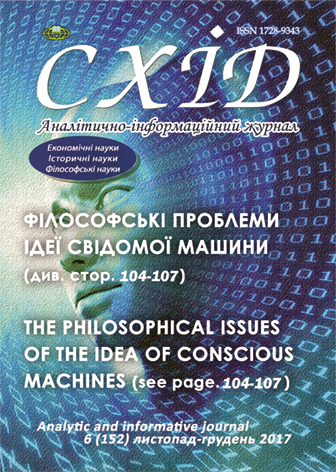International Socialist Movement on the eve of the First World War
DOI:
https://doi.org/10.21847/1728-9343.2017.6(152).122197Keywords:
socialism, II International, capitalism, parliamentAbstract
In this general article peculiarity of the activity of the international socialist movement on the eve of the beginning of World War Iis discussed. It was established that, despite the growing role of the socialists in the socio-political life of European countries, they represented only an organized labor movement. The most influential socialist organizations were in Germany, Great Britain, Belgium, as well as in France and Italy. At the same time, in the pre-war period, the socialists of Eastern Europe, in particular the Russian Empire had a negligible impact on the activities of the Second International. An association with the left ideology managed to achieve significant success in propaganda of socialist slogans and the organization of the working class after the suppression of anarchists. Despite the declarative ideas of unity in the Second International, socialists from different countries did not have a common vision of the prospects for the development of the socialist movement, its goals and priorities, as well as the relation to cooperation with the official governments of the states. This led to the ideological division in the socialist movement of the reformists and radicals. The ideological and political divisions testified to the weakness of the Second International. Most Left unions and movements were convinced that the Austro-Serbian conflict could be localized and it would not be the beginning of large-scale hostilities. Conclusions are drawn that the ideological differences in the II International ended with the split of the international socialist movement with the onset of large-scale hostilities in Europe.
References
Bernshtein, E. (1901). The problems of socialism and the tasks of social democracy [translat.]. W.p., Moscow, 230 p. (rus).
Datt, P. (1966). International. Essay on the history of the communist movement. 1848 - 1963 [translat.]. Progress, Moscow, 230 p. (rus).
Itenberg, B.S. (1964). The First International and Revolutionary Russia. W.p., Moscow, 232 p. (rus).
Krivoguz, I.M. (1964). Second International 1889-1914. W.p., Moscow, 495 p. (rus).
Kryvohuz, Y. M. and Stetskevych, S. M. (1958). Essays on the history of І and ІІ internationals. A manual for teachers, Uchpedhyz, Moscow, 216 p. (rus).
Leybzon, B. and Shyrinia, K. (1965). A turn in the policy of the Comintern (Towards the 30th anniversary of the Seventh Congress). W.p., Moscow, 424 p. (rus).
Lenin, V. I.(1967). Vol. 4. 1898 ~ April 1901. In: Complete works 55 volumes. Publishing house of political literature, Moscow, 163-176 (rus).
Lenin, V.I. (1965). The Third International and its place in history. In: Complete works 55 volumes Vol.38. Publishing house of political literature, Moscow, 302-309 (rus).
Orlov, B. (2005). Social democracy: history, theory, practice: Works. 2000-2005. Sobraniye. Moscow, 712 p. (rus).
Ponomarev, B. (1969). Historical significance of the Comintern. In: The Comintern and its revolutionary traditions. Materials of the scientific session devoted to the 50th anniversary of the formation of the Communist International (Moscow, March 25-26, 1969). Politizdat, Moscow, 120 p. (rus).
Fedenko, P. (1968). Socialism old and new. W.p. London-Paris-Munich, 231 p. (ukr).
Extraordinary International Socialist Congress in Basel on 24 and 25 November 1912. Berlin, 280 р. (germ).
Braunthal, J. (1961). History of the International. Vol.I. W.p., Hannover, 790 р. (germ).
Czubiński, A. (1966). The position of German Social Democracy on the colonial policy of the Second Reich in 1876-1914. W.p., Poznan, 322 p. (pl).
Eight International Socialist Congress held in Copenhagen from August 28 to September 3, 1910 (1911). Ghent, 511 pp. (fr).
International Socialist Congress, Stuttgart, August 18-24, 1907. Berlin, 142 pp. (germ).
Kautsky, K. (1906). The Erfurtprogram in its fundamental part. Stuttgart 1891 In: Tłumaczeniena język polski: Zasady socjalizmu. Cracow, 265 p. (pl).
Luksemburg, R. (1959). Social reform or revolution? In: Selection of letters. Vol. I. Warsaw, 890 pp. (pl).
Mehring, F. (1965). History of German Social Democracy. Vol. IV. Warsaw, 589 p. (pl).
Waldenberg, M. (1970). Political thought of Karol Kautski during the dispute over revisionism (1898-1909). Cracow, 210 pp. (pl).
Downloads
Published
How to Cite
Issue
Section
License
Copyright (c) 2018 Olexandr Malets

This work is licensed under a Creative Commons Attribution-NonCommercial-NoDerivatives 4.0 International License.
1. Authors bear responsibility for the accuracy of facts, quotations, numbers and names used.
2. Manuscripts are not sent back.
3. The publisher does not always agree with the authors' opinion.
4. The authors reserve the right to authorship of the work and pass the first publication right of this work to the journal under the terms of a Creative Commons Attribution Non-Commercial License, which allows others to freely distribute the published research with the obligatory reference to the authors of the original work and the first publication of the work in this journal.
5. The authors have the right to conclude separate supplement agreements that relate to non-exclusive work distribution in the form in which it has been published by the journal (for example, to upload the work to the online storage of the journal or publish it as part of a monograph), provided that the reference to the first publication of the work in this journal is included.

